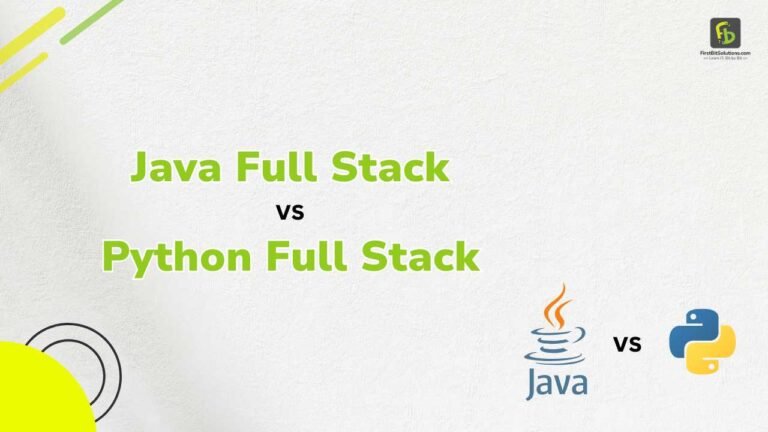Java remains one of the most popular programming languages today, and it’s only getting stronger. Whether you’re a college student, a recent graduate, or switching careers, learning Java can open doors. In Pune’s booming IT landscape, finding the right Java classes in Pune could be your first step toward a great tech career. In this blog, we’ll break down 10 reasons to learn Java in 2025 — from its massive community to Pune’s tech boom — so you can decide if Java is the right choice for you.
Reason 1: Java’s Popularity and Versatility
Java has been a cornerstone of software development for decades. It consistently ranks among the top languages worldwide – for example, the TIOBE index lists Java at #4 as of 2025. Around 9+ million developers use Java globally. It’s used everywhere – from Android apps to enterprise servers – so your skills stay in demand. In fact, one recent analysis notes Java powers “everything from enterprise applications to Android apps and cloud computing”. In other words, learning Java gives you a versatile foundation; code you write can run on desktops, phones, servers or in the cloud. This wide usage means Java knowledge lets you work in many fields (mobile, web, finance, etc.) and makes your skillset valuable for years to come.
Reason 2: High Demand & Pune’s Thriving IT Job Market
The demand for Java developers is still booming, especially in India’s tech hubs. Pune’s IT industry is growing rapidly – a recent report called Pune “one of the fastest-growing job markets” in India, with 39% year-on-year hiring growth. Top global tech companies and startups have set up development centers in Pune, creating loads of openings for programmers. Nationwide, India’s major IT cities (Bangalore, Hyderabad, Pune, Chennai, Delhi NCR) “offer abundant opportunities for Java professionals”. This means if you master Java, you’ll find plenty of jobs nearby. Employers need Java skills for backend services, cloud projects, and more, so completing a solid training program (for example, enrolling in Java classes in Pune at a reputed institute) can help you tap into this market.
Reason 3: Write Once, Run Anywhere (Cross-Platform)
One of Java’s famous perks is its cross-platform nature. Once you write Java code, it can run on Windows, macOS, Linux, Android phones, and cloud servers without major changes. This “write once, run anywhere” (WORA) feature is a huge advantage in 2025. It means your skills and code are portable – you’re not tied to one device or OS. Enterprises love this stability: they can build apps on one platform and deploy them everywhere. In short, Java’s platform-independence keeps it relevant; as one expert puts it, Java’s universal compatibility “ensures its continued relevance”. Learning Java lets you build apps for any platform with confidence that they’ll work across the tech ecosystem.
Reason 4: Android & Mobile App Development Opportunities
Java is the traditional language of Android. Even with newer options like Kotlin, most Android tools and tutorials are Java-based. Today Android controls over 70% of the global mobile market, and the Android OS “is largely dependent on Java.” That means Java skills are key to building millions of apps. With the mobile world only growing, expertise in Java means you can create Android apps or work on mobile backends – a huge advantage in your resume. Learning Java unlocks the mobile developer community, so you can build popular Android applications or switch to Kotlin more easily later on (since they interoperate). In short, Java knowledge equals mobile development power.
Reason 5: Enterprise & Backend Powerhouse
Many large companies still run on Java. Banks, e-commerce sites, telecom companies and big corporations often use Java for their backend systems, web services, and enterprise software. In India and worldwide, Java’s reliability and scalability make it the go-to for mission-critical projects. As one career guide notes, Java is preferred for its “extensive use in backend systems, Android development, and enterprise-level applications”. In Pune especially, many tech employers hire Java developers for enterprise projects. By learning Java, you can work on big systems for companies like MNCs or financial firms. Java’s strong typing and mature libraries mean your code can handle heavy loads reliably – a skill that employers pay well for.
Reason 6: Rich Ecosystem & Modern Frameworks
Java isn’t just a language – it comes with a whole ecosystem of tools. Frameworks like Spring Boot, Hibernate, and others make it easier to build complex applications quickly. For example, job listings frequently mention Spring Boot, microservices, REST APIs and cloud development as key Java skills. These frameworks help you create scalable, maintainable code faster. You’ll also find tons of libraries for everything from web servers to database access. In short, Java has ready-made solutions for almost any programming need. Learning Java also teaches you how to use these frameworks, which is exactly what employers want. In 2025, Java’s ecosystem continues to grow (think modern trends like microservices and reactive apps), so once you learn Java the path to using these frameworks is straightforward.
Reason 7: Cloud-Native & Future-Ready
Java is evolving with the times. It works great in cloud and microservices architectures. Major cloud providers like AWS, Azure, Google Cloud, and Oracle all offer Java SDKs and services, making it easy to deploy Java apps to the cloud. Java’s performance and garbage collection make it a solid choice for cloud-native applications. Also, newer Java runtimes (like Eclipse-based server runtimes) are optimized for containers and Kubernetes. Learning Java now means you can smoothly transition into cloud development roles as well. In Pune’s startups and tech companies, cloud skills are in demand, and Java ties right into those. By learning Java, you’re positioning yourself for modern development (cloud, DevOps, serverless) on day one.
Reason 8: Stability & Continuous Updates (LTS Releases)
Java’s development cycle ensures stability for learners. Oracle releases a new Java version every six months, with Long-Term Support (LTS) versions every few years. For example, Java 17 (an LTS release) is supported for years ahead. This regular update model means the language keeps improving (better performance, new features) without breaking old code. Enterprises love this because they get new features and security fixes, yet their old applications keep working. For you, it means whatever version you learn today will still be in use for a long time. In other words, investing time in Java now isn’t wasted effort – the language is both stable (your skills won’t become obsolete) and growing (you’ll learn new features as you go). This confidence is rare; in 2025, Java’s ongoing evolution makes it a safe, future-proof choice.
Reason 9: Supportive Learning Environment & Community
Learning Java is made easier by a massive community and plenty of resources. Tons of free tutorials, forums, and example projects are available online – whether you’re coding alone at home or taking a course. In India especially, there are affordable training options: one report notes that quality tech courses in India (like Pune’s coding classes) cost a fraction of what they do elsewhere. Cities like Pune have a strong IT ecosystem with training centers and meetups for Java learners. For example, institutes like FirstBit Solutions in Pune offer hands-on Java classes in Pune, complete with project work and placement support, making it easier for beginners to get started. Plus, Java’s large developer community means answers to your questions are easy to find (StackOverflow, GitHub, local user groups, etc.). In short, you won’t be learning in isolation – there is tons of support and many peers in Pune and online who are also learning Java.
Reason 10: Strong Career Growth & Rewards
Finally, from a career standpoint Java opens many doors. Software developers and Java engineers command competitive salaries and job security. Analysts predict software developer jobs (including Java roles) will grow by roughly 24% over the next few years, much faster than average. That means more jobs and better positions for skilled Java devs. Even if you’re just starting out, freshers can soon move up to roles like full-stack developer, team lead, or architect with Java experience. In Pune’s tech industry, senior Java developers are in high demand and rewarded with promotions. Overall, Java skills give you both immediate job options (internships, junior dev roles) and a clear path to grow (senior developer, architect, or even tech manager). Coupled with the other reasons above, this makes Java one of the smartest career moves for 2025.
Conclusion
Java is more relevant than ever, and there are many good reasons to learn it in 2025. Its huge popularity and versatility mean the skills you gain will serve you for years – whether you’re building Android apps, cloud services, or enterprise software. The job market in Pune and India is hungry for Java talent, so you can find employment quickly after learning it. Plus, the wealth of community support, libraries, and training options (especially Java classes in Pune) makes learning Java practical and fun.
If you’re ready to get started, consider enrolling at a reputable institute. For example, FirstBit Solutions in Pune offers excellent Java training with experienced instructors and placement assistance. Their hands-on Java courses in Pune are designed for beginners and career switchers, helping you build real-world skills.
Don’t wait: take the plunge into Java this year and give your career a major boost. With the reasons above in mind, Java is clearly a great language to learn in 2025 – and joining a trusted training program like those at FirstBit Solutions can set you on the path to success.



